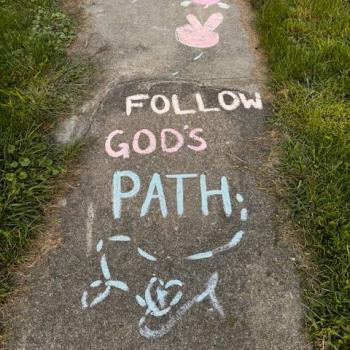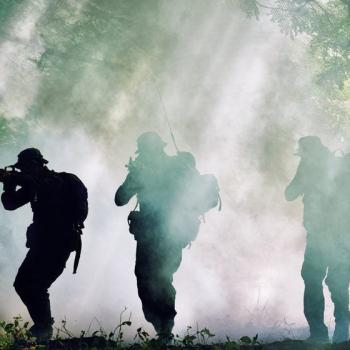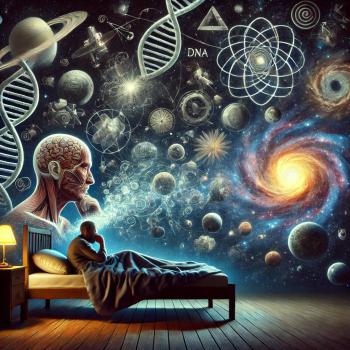Left Behind II: Tribulation Force, Part 7
We’ve arrived at the fork in the road.
Up until now we’ve been watching an adaptation of Tribulation Force, the novel. The characters on the screen are taken from that book, and what we’ve seen thus far has mostly been a re-enactment of scenes originally written there by Jerry Jenkins and Tim LaHaye. As in any adaptation, those scenes have been tweaked and streamlined, with a few minor departures — Chris Smith is alive, Ivy substitutes for Spiky Alice, etc. — but the story the filmmakers have been telling up to this point has been mostly the same as the one in the book.
That changes here. The rest of this movie tells a different story. It’s still not a good story, but it’s a better story than what we found in the book.
This was a bold move for the filmmakers, one that risks alienating the fan-base. That risk is always present whenever a popular book is adapted for the screen, but it was especially true in the case of this project. This is a direct-to-DVD version of a book that sold tens of millions of copies. More people read that book that are likely to ever see this movie, and the target audience for this movie consists almost entirely of people who already read the book. So changing the story was a big risk.
But that big change in the story was necessary. The book’s fans may have wanted a strictly faithful adaptation of Tribulation Force, but that wasn’t an option. The story of the novel isn’t filmable because the novel doesn’t really tell a story.
The characters in the novel don’t do anything. Some things happen to them, or near them, or around them, but the events that unfold in the book do not occur because of decisions or actions made by the main characters. The heroes of the Trib Force are passive bystanders. Even the villain, Nicolae Carpathia, spends the first 400 pages of the book as an inert presence whose evil is constantly asserted, but not demonstrated.
When Jenkins abruptly skips forward in time — “Eighteen months later” — one suspects it’s partly due to his recognition of readers’ increasing boredom, and partly due to his being bored himself with the book’s belabored uneventfulness.
Again, though, this can’t be blamed entirely on Jenkins. His task was to follow the precise timetable of LaHaye’s prophetic scheme, and the truth is that in LaHaye’s version of the “Great Tribulation,” the first year or so of that seven-year period isn’t that bad. LaHaye’s imagined Antichrist starts out as more of a benign bureaucrat than a tyrannical monster. And the nasty displays of divine wrath don’t get started until much later, so a novel portraying the early portion of the Tribulation was bound to be kind of dull.
Plus, more skeptically, I think the authors were milking the runaway success of the first book. Their initial idea of a trilogy was getting padded out into a 12-book series (ultimately even longer) and Tribulation Force was stuffed with that padding. The time-skip, also, allowed the authors to gloss over the parts of LaHaye’s prophecy that they weren’t able to explain or describe as something that might happen in reality. One-world currency, one-world religion, one-world language? How? Why? By skipping ahead to where such things could be portrayed as a fait accompli, the authors never have to answer those questions.
All of which makes for a book that defies adaptation into a movie. You can’t make a 90-minute movie in which the hero and the villains tread water for the first 80 minutes before you skip ahead a year and a half to when, in the final 10 minutes, the villain destroys London and Washington while the heroes get stuck in traffic. No one wants to see that movie.
So what if, instead, the villain actually does something villainous? And what if, instead, the heroes tried to stop him? That would give you an actual story for your movie — a better story but also, necessarily, a very different story.
And so here we arrive at the point where our heroes discover that movie-Nicolae, unlike book-Nicolae, is planning something. And here, unlike in the book, those heroes decide to try to foil his plan.
Unsatisfied that iconic stock footage of the Temple Mount and stereotypically Jewish-sounding music convey the setting, director Bill Corcoran also supplies a subtitle informing us that we’ve arrived in Jerusalem.
Rayford Steele knocks at the door of Cam-Cam’s vast and multi-chambered hotel room, and they sit down to examine the file he copied off of Nicolae’s laptop computer. It’s the speech that Rabbi Tsion Ben-Judah will be giving to announce the results of his research project on the identity of the Messiah. But here, unlike in the book, it seems that Ben-Judah has concluded that the Messiah is Nicolae, not Jesus.
In both the book and the movie, the Jewish longing for the coming of Messiah is portrayed as exactly parallel to the premillennial dispensationalist longing for the coming of the Antichrist. Tim LaHaye imagines that Jewish believers view the world just like he and other “Bible prophecy” enthusiasts do — poring over the scriptures to compile a check list and then scanning the headlines of the newspaper for any likely candidates. LaHaye can’t imagine that Judaism consists of anything more than or other than that, just as he can’t imagine that Christianity consists of anything much beyond that.*
All Christians, of course, read the Hebrew scriptures through the lens of Jesus Christ. As that name — Christ-ians — implies, this is how we try to read everything, so for us the story of Jesus shapes and reshapes the stories of those books we call the “Old Testament.” But for most of us that doesn’t mean reducing those stories into little more than a series of prophecies and a messianic check list inescapably and obviously pointing to Jesus of Nazareth. (Or, in the case of Daniel, an anti-messianic check list inescapably and obviously pointing to the pope Mikhail Gorbachev Saddam Hussein Osama bin Laden Moammar Gadhafi Barack Obama.) Nor for most of us does it mean that ours is the only possible and only legitimate reading of those stories.
LaHaye simple cannot imagine that any honest reader of the Hebrew scriptures could see there anything other than what he sees. The conclusion he draws from the Old Testament (which is actually the presupposition he imposes on it) is to him so glaringly obvious that he portrays Jews who don’t share that conclusion as deliberately obtuse and stubbornly rebellious. Thus we have, in the books, the character of Tsion Ben-Judah — the lone honest Jew.
That’s also why, in the books as in this scene from the movie, a brand-new believer like Buck Williams is shown to be more of an expert on the Hebrew scriptures than any rabbi.
“Come on, Ray, look,” Cam-Cam says, “the Messiah will be pierced without breaking a bone — we all know that was Jesus Christ.” He is exasperated by the idea that anyone could come to any other conclusion, that anyone could possibly read the Old Testament and not say that.
But there’s a subtle difference here from the way Ben-Judah’s research was presented in the book. In the novel, Rayford and Buck instantly know what it took Ben-Judah years of study to understand** not because they are smarter or more learned, but because they are honest and he, like all Jews, is stubbornly dishonest. Here in the movie, their superior understanding depends more on Jesus Magic.
Jesus Magic is never explicitly described as such in the books, but it’s there, implicit throughout. That Jesus Magic and the unwritten rules governing it shapes the plot of the rest of this movie as it departs from the story in the novel.
Blessed by the power of Jesus Magic, Cam-Cam and Rayford quickly determine that the one honest Jew’s research has been corrupted. The Antichrist must be working his mind-control mojo on Ben-Judah to ensure that the rabbi will go on TV to declare to the world that he, Nicolae Carpathia, is the Messiah. How dastardly!
This plan actually makes sense for an Antichrist. That’s the job — to take over the world as a false Messiah. So movie-Nicolae is much more professional than the amateurish Antichristing we see on display in the book. Book-Nicolae just sits there crossing his fingers and hoping that the upcoming Big Messiah Announcement will be about him, but here he’s making sure that’s what happens.
Cam-Cam quickly formulates a plan. Since Jesus Magic is the only effective counterspell to Antichrist mojo, he’ll take the rabbi to the Two Witnesses — the most powerful magicians around. They’ll break Nicolae’s enchantment, freeing Ben-Judah to declare Jesus the Messiah.
It’s a little crazy … but it just might work!
Brad Johnson again reminds us that he’s an old pro and thus has a better idea of how to handle this material than his former teen-idol co-star. This is phlebotinum, and unlike Kirk Cameron, Johnson is wise enough not to dwell on the details or the mechanics of it. He knows his job here is to get through those details as quickly and enthusiastically as possible. He knows that the only thing he really needs to convey to the audience here is “blah blah blah, this is what we have to do next because horcrux, Hellmouth, tachyon pulse.”
“But how?” he says, demanding exposition. Cam-Cam begins reciting the explanation, as though that were what was important or as though it actually makes real-world sense. Cameron’s not trying to get through the phlebotinum, he’s actually trying to explain it, poor guy. So while he does that, Johnson leaps up out of his chair and starts pacing, displaying that what’s really important here is that this is where the heroes are springing into action. This is what we have to do next, just go with it, OK?
Cam-Cam’s plan requires him to gain access to the Wailing Wall where the Two Witnesses are preaching, so we see him at GNN’s Jerusalem offices, talking to Steve Plank to try to secure the necessary permission.
He can’t just tell Steve all about his plan, of course. Steve’s working for Nicolae. So Cam-Cam tells him that he aims to “discredit” the preachers, to “make them go away” so that they cease interfering with Nicolae’s wonderful plan for global unity without dissent.
In other words, he lies. He does so without any of the hand-wringing and pious dithering about such lying that we find in the book. He just lies, because he has a plan to stop Nicolae and acting on that plan requires him to lie.
Just as Rayford lied through his teeth in order to get the pilot gig and then again to cover for his skulking about on the plane, Buck has to lie here. Both of them are double agents. They’re posing as servants of the Antichrist while really pursuing another, hidden agenda. That means both of them have to lie, pretty much constantly. The book refused to acknowledge that, but here in the movie it’s just a given. Good for the movie.
Meanwhile, back in the Chicago suburbs, it seems the New Hope Village Church and Mobile Surgical Hospital is larger than I thought, containing another sanctuary-sized room in which the field hospital is still operational. Burn-Victim Guy is still there, looking no better than we last saw him. That’s to be expected, because he’s on a cot in a church basement rather than in a sterile burn unit where he could get the care he needs.
Chloe sits by his cot, reading to him from the Bible. She’s reading a passage from the Gospel of John that is often read as a source of comfort. I’m not sure it’s appropriate here, though, since when you’re talking to someone who got turned away by every real hospital, “I will go and prepare a place for you” sounds a bit too bitterly ironic.
This clinic just seems like a half-baked horror show — a nightmare for any patient who winds up there. Everything about the place seems as carelessly slap-dash as the crude hand-made red-cross armband Chloe is wearing (I suppose so as not to be targeted by enemy fire). When poor BVG’s wounds start to fester, it seems the response will be to turn off a couple of those anemic desk-lamps, because if you can’t see it, it can’t hurt you.
Don’t miss the spiritual lesson here. When the BVG was first brought to the clinic, Chloe recoiled and ran away, unable to perform her assigned ministry. She’s able to do that now. Why? Because now that she’s right with her man, she can be right with God. That’s how it works for girls in this little world.
Ivy enters the scene, appearing to be both an unsaved stranger bewildered to find herself in a church and a professional actor bewildered to find herself in this movie. Having fulfilled her initial function as Spiky Alice’s stand-in in the Not What It Looks Like business, she returns with a new purpose. She provides Chloe someone to witness at, much the same way that Chris Smith provided that for Rayford.
After clearing up their earlier disagreement over Buck, the conversation quickly turns to religion. In response to Ivy’s unbelief, Chloe says this:
I guess it’s like my mom said, faith is a choice. And it comes from the heart, so you either want to believe it or you don’t.
This is theologically incoherent. Any Reformed or Calvinist viewers who somehow managed to stay in their seats up until this point will be storming out of the theater after hearing Chloe say that. We could try to parse this out — Is faith a “choice”? A matter of volition and will? Or is it a thing one “wants”? An unbidden inclination of “the heart”? Or we could try to reconcile this with Buck’s plan to compel Tsion Ben-Judah to have faith. But tracing through any of that involves more brain-twisting effort than the screenwriters themselves seem to have put into this, so instead let’s just follow their lead, chalking it up to Jesus Magic and quickly moving on.
A day-time establishing shot of the Damascus Gate, accompanied again by the Jerusalem music, is allowed to indicate, sans subtitle, that we’re back in Israel. Rabbi Tsion Ben-Judah sits in a cafe populated by extras in yarmulkes and clip-on payot. The goat exits and Cam-Cam enters and approaches the clean-shaven rabbi:
“My name is …”
“Buck Williams, I think the whole world knows who you are.”
Lubomir Mykytiuk is another old pro out of place in this film. You’ve seen him before, usually as The Russian or The Professor, or sometimes as The Russian Professor.
Cam-Cam needs to convince the rabbi to play along with his plan, accompanying him to the Wailing Wall to meet the Two Witnesses. Again, though, he can’t tell the truth about the whole plan, because Ben-Judah is still under Nicolae’s mind-control enchantment, parroting the Antichrist’s rhetoric.
So Cam-Cam again lies, as he should, pretending that he needs the rabbi’s help to embarrass the preachers so that they will stop interfering with Nicolae’s grand and glorious goals. He pretends the plan is “a gift to Nicolae” — a way to get the rabbi to “expose these men” while Cam-Cam gets it all on tape.
Cut to the Jerusalem branch office of Nicolae’s secret lair, where Steve Plank is explaining Buck’s plan to the Antichrist in the same terms Cam-Cam just explained it to the rabbi. Steve bought the cover story. Steve and Nicolae, like the rabbi, can’t mention Buck Williams without prefacing that discussion with extravagant praise of the GIRAT. (I’m beginning to wonder if this was a clause in Kirk Cameron’s contract.) Steve tells Nicolae that Buck is planning to try to “discredit the witnesses.”
Steve uses that term: “the witnesses.” He’s knowingly quoting from Revelation 11, using its terminology to describe the two preachers. This, again, is a departure from the books, where no one outside of Bruce and his followers uses that term. So here in the movie, Steve and Nicolae know exactly what the deal is. They know that Nicolae is the biblical Antichrist that Tim LaHaye describes. They know who the Two Witnesses are, and what they will do.
“If I thought he could,” Nicolae says wistfully. Gordon Currie speaks the line with a sadness that suggests a grateful fondness for Buck Williams, mixed with resignation that he cannot prevent “the witnesses” from doing what LaHaye says Revelation 11 says they will do. So Nicolae knows that he is the Antichrist, but he doesn’t yet know that Buck Williams is a devious Christian spy.
He orders an aide to choke off any attempt to broadcast live from the Wailing Wall, then tells Steve to order that “any and all trespassers will be shot on sight.”
Cam-Cam’s plan requires him to get the rabbi to the wall, but the wall will be guarded with lethal force. The scene is set for a big showdown.
That didn’t happen in the book.
– – – – – – – – – – – –
* LaHaye is also unable to imagine anything other than a strictly premillennial Judaism — a faith that, like his own, sits in a kind of suspended animation, waiting for the day when prophecy will be fulfilled. The notion that Judaism might involve anything important before then, or that it might involve preparing for the coming of Messiah, is too post-millennial for LaHaye to be able to grasp.
** Ben-Judah’s years of study are, like Bruce’s long nights of study, a conceit that makes little sense. Just as the prophecy template that Bruce is endlessly reviewing is a simple outline that could be mastered in a week’s time, so too the prophecy check list of Ben-Judah’s is the sort of thing that one ought to be able to whip up in a weekend skimming through Jews for Jesus tracts and a couple of Josh McDowell books. Neither project really involves study or scholarship, only the abrupt leap to accepting a single premise that is then allowed to reframe everything else.
















